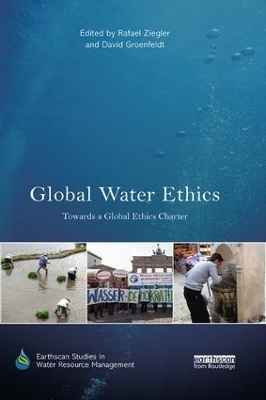
Global Water Ethics
Routledge (Verlag)
978-0-367-22681-7 (ISBN)
Scholarly interest in water ethics is increasing, motivated by the urgency of climate change, water scarcity, privatization and conflicts over water resources. Water ethics can provide both conceptual perspectives and practical methodologies for identifying outcomes which are environmentally sustainable and socially just. This book assesses the implications of ongoing research in framing a new discipline of water ethics in practice.
Contributions consider the difficult ethical and epistemological questions of water ethics in a global context, as well as offering local, empirical perspectives. Case study chapters focus on a range of countries including Canada, China, Germany, India, South Africa and the USA. The respective insights are brought together in the final section concerning the practical project of a universal water ethics charter, alongside theoretical questions about the legitimacy of a global water ethics.
Overall the book provides a stimulating examination of water ethics in theory and practice, relevant to academics and professionals in the fields of water resource management and governance, environmental ethics, geography, law and political science.
Rafael Ziegler is Head of Research at GETIDOS (Getting things done sustainably), based in Greifswald, Germany. He has worked as a lecturer at McGill University, ECLA and FU Berlin, and as a Deputy Professor of environmental ethics at the University of Greifswald. David Groenfeldt is Director of the Water-Culture Institute in Santa Fe, New Mexico, and an Adjunct Associate Professor of Anthropology at the University of New Mexico, Albuquerque, USA. He is the author of Water Ethics: A Values Approach to Solving the Water Crisis (Routledge, 2013).
1. Introduction: global water ethics – towards a water ethics charter Rafael Ziegler and David Groenfeldt 2. A brief history of efforts to articulate global water ethics Susan Lea Smith Part 1: Ethics and epistemology 3. What is water ethics and to what end do we study it? Lessons for the water ethics charter Simon Meisch 4. Beyond general principles: water ethics in a Deweyan perspective Martin Kowarsch 5. Incorporating ethics into water decision-making David Groenfeldt 6. Transcending water conflicts: an ethics of water cooperation Angela Kallhoff Part 2: Global water ethics, local cases and a diversity of perspectives 7. Safe, just and sufficient space: the planetary boundary for human water use in a more-than-human world Rafael Ziegler, Dieter Gerten and Petra Döll 8. The relevance of ethical factors in the pursuit of integrated water resources management Maite Aldaya, Pedro Martínez-Santos and Ramon Llamas 9. A hierarchy of water needs and their implications for allocation mechanisms Eran Feitelson 10. Reflections on water ethics and the human right to water in Khayelitsha, South Africa Lucy Rodina 11. An eco-centric water allocation across competing demands in an arid inland river basin of Northwest China Jie Liu and Xiang Huang 12. Water, virtue ethics and traditional ecological knowledge in Rajasthan: Anupam Mishra and the rediscovery of water traditions Ricki Levi and Daniel Mishori Part 3: Water ethics charters and charting water 13. I yá.axch´age? (Can you hear it?) or, marrying the water: a Tlingit and Tagish approach towards an ethical relationship with water Eleanor Hayman with Colleen James, Mark Wedge and David Katzeek 14. Developing an ecumenical framework for water justice Susan Lea Smith 15. Developing a global water ethics charter David Groenfeldt 16. The Berlin Water Charter: water ethics from an activist’s viewpoint Dorothea Härlin 17. Water ethics and water stewardship: personal reflections Adrian Sym
| Erscheinungsdatum | 25.03.2019 |
|---|---|
| Reihe/Serie | Earthscan Studies in Water Resource Management |
| Zusatzinfo | 19 Illustrations, black and white |
| Verlagsort | London |
| Sprache | englisch |
| Maße | 156 x 234 mm |
| Gewicht | 453 g |
| Themenwelt | Geisteswissenschaften ► Philosophie ► Ethik |
| Naturwissenschaften ► Biologie ► Ökologie / Naturschutz | |
| Technik ► Umwelttechnik / Biotechnologie | |
| ISBN-10 | 0-367-22681-2 / 0367226812 |
| ISBN-13 | 978-0-367-22681-7 / 9780367226817 |
| Zustand | Neuware |
| Haben Sie eine Frage zum Produkt? |
aus dem Bereich


